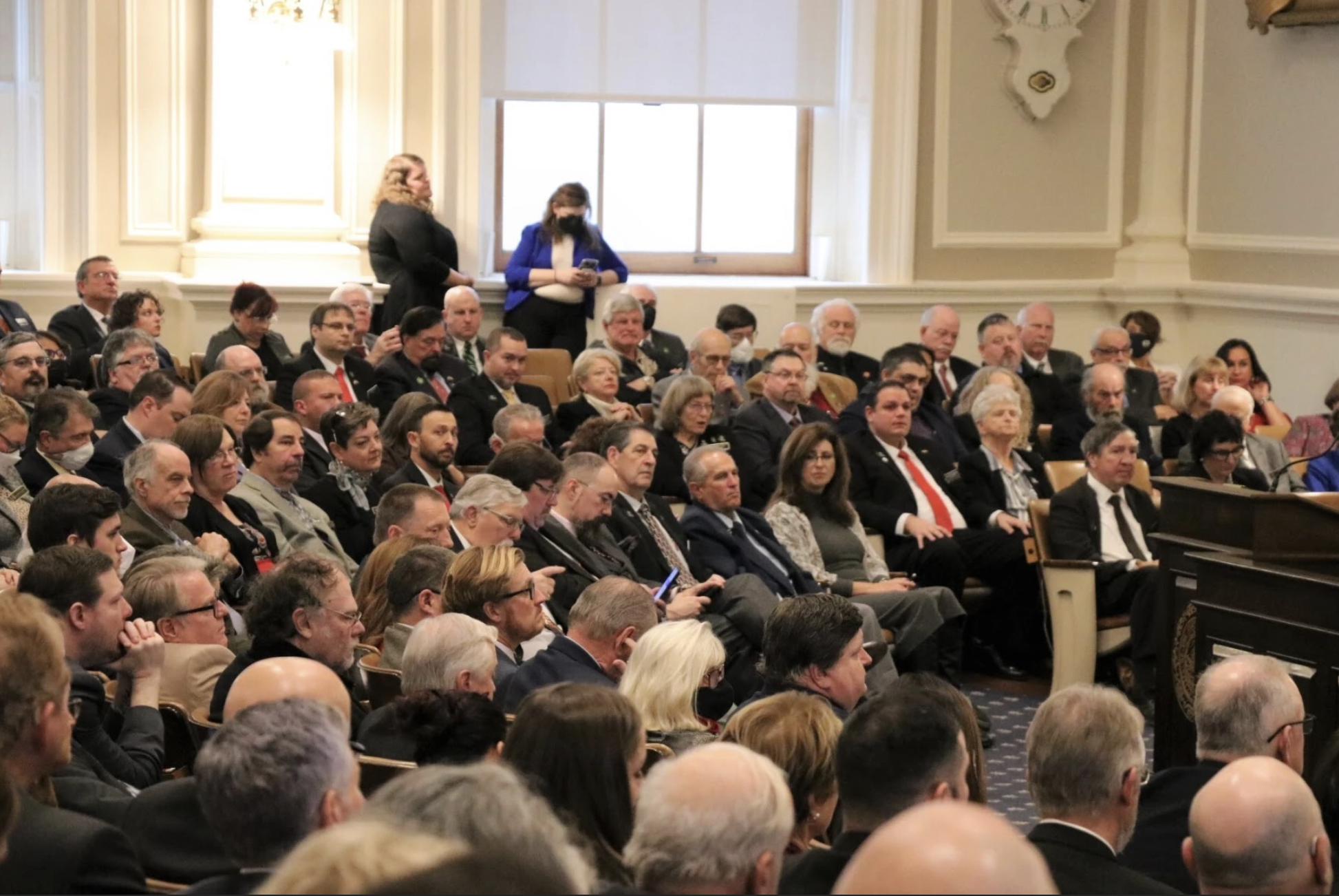900 Bills for ’24: A look at some of the bills requested for 2024 state legislative session
New Hampshire legislators have requested more than 900 bills for 2024, covering everything from abortion rights to daylight savings time. What are their priorities for the upcoming year? Melanie Plenda talks with Anna Brown, research and analysis director of the nonprofit, nonpartisan Citizens Count

New Hampshire legislators have requested more than 900 bills for 2024, covering everything from abortion rights to daylight savings time. What are their priorities for the upcoming year? Melanie Plenda talks with Anna Brown, research and analysis director of the nonprofit, nonpartisan Citizens Count, about what’s going on in the state Legislature and what bills might be discussed this session.

This article has been edited lightly for length and clarity.
Melanie Plenda:
At Last count, it looked like there were 906 legislative service requests. So can you tell us about those? What are they and what do they entail?
Anna Brown:
A legislative service request, often abbreviated LSR, is a request for a bill. So each LSR is numbered and listed on the state Legislature’s website with a one-sentence description of what the bill is about. So we get a preview of what legislators want to work on in ’24, but we don’t get the full bill text yet.
Melanie Plenda:
How does the process work with these service requests and the legislators?
Anna Brown:
Legislators file their requests with the Office of Legislative Services, government employees whose job is writing bills. Sometimes legislators come with mostly written bills, and fully formed ideas, but other times it’s a lot more sketchy and just a concept. After all, you don’t have to be a lawyer to be a state legislator. We have citizen legislators, they’re paid $100 a year plus mileage. So the professionals at the State House are there to help with the legalese. There is also an opportunity to file secret bill requests, which we see in the Senate, that give legislators more time to work on the bill without alerting other people that might be interested in it. And so then they have that drafting process in secret. But the vast majority of those 900 bill requests are public.
Melanie Plenda:
Can you explain why there’s a secret and a nonsecret version of this process?
Anna Brown:
Well, you can speculate why legislators might want to sort of keep it behind the scenes or not. They don’t necessarily need to move forward with a bill. I think also sometimes you’re working with really big important legislation that could have a lot of stakeholders involved. There’s more of a spotlight and pressure if you put out that public legislative service request. Whereas if you do it in secret, you may have more chances to do some negotiating and fine-tuning. That could be strategic also just to advance your own priorities. But it could also allow you to have a safe space to talk with people on both sides of the aisle and work out a path forward.
Melanie Plenda:
So let’s talk more about the substance of these requests. Some of them hit on perennial topics. So for example, abortion — what can you tell us about the abortion bills, we’re likely to see this session?
Anna Brown:
First thing I will say is, I don’t expect we will see big changes in abortion laws this year in either direction. There’s two reasons for that. First, we have a very narrow split in the House. And last year, we saw it was difficult for Republicans to get new restrictions moved forward, because there were moderate Republicans that were joining with Democrats and actually passing some protections for abortion or maybe removing penalties related to the 24-week ban.
On the Senate side, you have the Republican majority, and they rejected those bills that would have protected certain abortion rights. That being said, the abortion debate does come around every year. And it does seem extra important right now because the federal government did go hands-off after the Supreme Court overruled Roe v. Wade.
On one side, we have representative Dave Testerman, who is a Republican from Franklin, requesting a ban after 15 weeks gestation. On the Democratic side, Rep. Amanda Toll, a Democrat from Keene, is requesting a constitutional amendment that would protect the right to abortion before 24 weeks. So there will be a debate in both directions. But as I said, not expecting big movement there.
Melanie Plenda:
Marijuana legalization — what’s happening with that this year?
Anna Brown:
This is another one every year, but I think we could see some big movement here. There was a commission that was charged with studying a state-run model over the past few months. This was the idea that was supported by Governor Sununu last spring, and their report is due Dec. 1. That’s going to be the big bill, whatever they’re recommending, I would keep my eyes on that, because any other idea is likely to get a veto from Governor Sununu. But there are many other bill requests that deal with medical cannabis laws. For example, allowing home-growing, expanding the qualifying medical conditions, maybe for generalized anxiety disorder, for example. And those bills have found success in the House. Certainly, sometimes they meet some resistance in the Senate, so even if you don’t see that big legalization bill comes through this year, there is also a lot of other movement kind of on the edges.
Melanie Plenda:
So what about gun laws? What might we see there?
Anna Brown:
Yet another perennial issue, but also one that I think is definitely held up by that narrow split in the House and really moving in either direction at that point. There are a couple of interesting ones because we always see bills related to expanding background checks or maybe guns on school grounds, although I’m not sure I have seen a request related to that this year yet.
One that caught my eye that I thought was interesting is a request from Rep. David Meuse from Portsmouth. This would allow a voluntary waiver of the right to purchase a firearm, the concept being that if you, for example, think that you are in a not mentally healthy place and you don’t want to have access to lethal means. If you are at risk of suicide, then you could basically put yourself forward and say, “I want the government to deny me a firearm if that comes to that.”
That’s a different approach than I have seen in the past because it is voluntary. It’s not, for example, a red flag approach where someone else would go to a court and say, “I think this person should be put on a list. For their safety or my safety, they should not be able to get a firearm.” This would be the person themselves coming forward. So I think it’d be very interesting to see how that debate unfolds, because it’s sort of that interesting clash of the right to make personal decisions about yourself, and then also a constitutional right, and where does that intersect?
Melanie Plenda:
Let’s discuss criminal justice. Will we be seeing any bills in that realm?
Anna Brown:
The biggest topic here is definitely bail reform. A few years ago, New Hampshire made it harder to hold someone in jail just because they couldn’t make bail. For example, if you’re homeless, and you can’t pay for bail, then you’re stuck in jail, whether or not you actually committed the crime you’re arrested for and it’s a bit of a vicious cycle. But in Manchester, in particular, there’s been a lot of concern that too many people are getting let out who shouldn’t be back on the streets, they’re reoffending. And the debate continues.
This is a multi-year debate, and several bills were held back over the summer looking to change this either for certain crimes and certain repeat offenders. Those are the bills we’re looking at. I didn’t see a whole lot of new bill requests for 2024 related to criminal justice reform, unless you’re including some bills related to drugs and how we are dealing with that. Of course, the marijuana legalization bills are sort of part of that conversation. But I think bail reform is for sure the number one focus.
Melanie Plenda:
Finally, there’s everyone’s least favorite topic: taxes. What discussions will be happening around those in the Legislature?
Anna Brown:
Most tax debates really happened last year as part of the state budget debates. That being said, there are several proposals for housing tax credits, some version or another, whether it’s historic housing or low-income housing or new housing, or what have you. And I think it was interesting that Republican Majority Leader Jason Osborne has requested a constitutional amendment that would require a two-thirds vote, a supermajority, to pass legislation that has new taxes or fees or would require the issuance of a state bond. Constitutional amendments have a higher vote threshold, both in the legislature and then they have to go to the public. So I’m not saying that this is likely to become law. But it is a debate that has come around now and again in the Legislature, and I think it’s notable because it is the majority leader who has requested it.
]Melanie Plenda:
Anna Brown, thank you so much for joining us today.

These articles are being shared by partners in The Granite State News Collaborative as part of our Race and Equity Initiative. For more information visit collaborativenh.org.
The State We’re in a weekly digital public affairs show is produced by NH PBS and The Marlin Fitzwater Center for Communications. It is shared with partners in the Granite State News Collaborative, of which both organizations are members.





